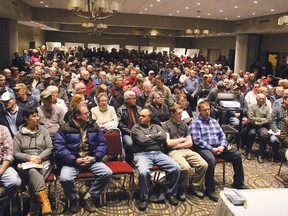Staking their own claim

Article content
Uncertainty and the lack of public consultation with residents who hunt, fish and otherwise enjoy the outdoors in Eastern Ontario has made many people nervous about the Algonquin Land Claim process, and how it would impact them.
What residents are most worried about is how this land claim will affect the hunting and fishing opportunities, and their use and access to Crown land, as well as the lakes and rivers which are situated on them.
Now, with an agreement-in-principle having been reached and a round of public information sessions about to begin, groups representing the interests of Ontario outdoorsmen are rallying the public to make sure their opinions about it are heard loud and clear.
On Thursday, an overflow crowd of more than 400 people crowded into the Campbell Room at the Best Western Inn and Conference Centre, filling all available chairs, standing in the back and crowding into the hallway outside. The parking lot was filled to capacity with vehicles, as were the sides of International Drive and the lot at the Pembroke Welcome Centre.
They were attending a meeting organized by the Ontario Federation of Anglers and Hunters, the Canadian Sportfishing Industry Association and the Federation of Ontario Cottagers’ Association, the fourth in a series of five meetings which have been held across Eastern Ontario, timed to be ahead of the government public information sessions, scheduled to begin next week.
(One of these sessions is scheduled for Pembroke on Thursday, Mar. 14, and will also be held at the Best Western, from 3 p.m. to 8 p.m.)
The idea, according to organizers, was to forewarn and forearm local residents about the impact this agreement in principle could have on them if it is ratified without changes.
Angelo Lombardo, executive director of the OFAH, said over the years they’ve worked really hard on this land claim file, and are really bothered by how large tracts of “a fully occupied and utilized landscape” are being affected by a process most of the users of that public land never had a say in.
“We are not disputing the legitimacy of the claim,” he said.
Aboriginal harvesting rights, are clearly defined in section 35 of the Constitution of Canada, and confirmed by the Supreme Court.
“What we are saying is some 1.4 million people and 8,000 Algonquins (who are not part of the claim process) have the right to expect the government to be negotiating in good faith in a fair and equitable manner.”
“The problem is this process to date has been everything but fair and equitable,” and instead has been conducted behind closed doors and without consulting those who would be more directly affected by the land claim.
Matt DeMille, OFAH’s assistant manager of Fish and Wildlife Services, said their concern is the land claim will turn many parcels of Crown or public land into private ones, leading to the possibility that people who now enjoy hunting, fishing and cottaging may one day find out they can no longer do so.
He said this land claim has the potential to see the public end up not being able to get access to lakes, rivers and lands they can now, being cut off from places they have enjoyed for generations, and otherwise be unable to enjoy the quality and traditional way of life they currently enjoy.
“The biggest question,” he said, regarding such a huge change to the use of Crown land “is why were you not consulted?”
A long time in coming, the agreement in principle (AIP) respecting the Algonquin Land Claim has been at least 20 years in the making, involving both the federal and provincial governments and nearly a dozen Algonquin First Nations.
The land claim covers an area of approximately 36,000 square kilometers, stretching from the Ontario/Quebec border to beyond North Bay. Within the AIP there is a proposed transfer of Crown land to the Algonquins of Ontario (AOO) of not less than 117,000 acres. Of that 117,000 acres, approximately 80 per cent lies within the riding of Renfrew-Nipissing-Pembroke, making it the area which is the most directly affected by the proposed settlement.
It has been proposed another 15,000 acres within the claim area in the province should be set aside as a provincial park.
Realistically, if this moves forward without major changes, finalizing it into a formal treaty will likely take at least a half dozen years or more, unless it is derailed along the way by numerous court challenges launched by other Algonquin peoples who were not, or have never been part of the negotiations or who have competing and overlapping claims on the same territory. The Metis, too, who recently had their right to seek land claim agreements backed by the courts, may also be proceeding on that path.
DeMille said at this next stage in the process, they are encouraging people to come forward and make their voices heard to their local politicians, and get them to take into account how the land claim could affect them.
“You need to tell the government how this will affect you,” he said, noting that is the only way any sort of change will happen to the land claim agreement.
Stephen Uhler is a Daily Observer multimedia journalist